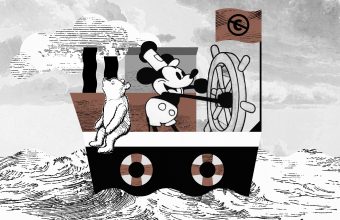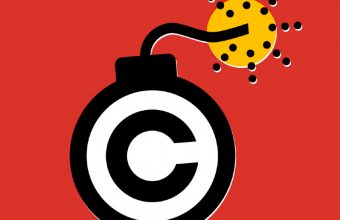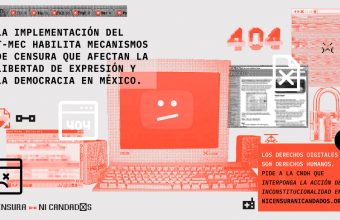The organizations of the Chilean society civil who subscribe below, have wanted to show publicly their position with respect to the proposal of the government of Chile to include in the agenda of 13th Meeting of the Standing Committee on Copyright and Related Rights of the WIPO, the discussion about exceptions and limitations to the copyright.
1.- Current situation in Chile
Chile has a legal aplicable copyright regime from earlier 70’s, which has been actualized –for example in relation with the incorporation of data bases and software as protected works, and the extension of the protection period as well–, but it is not yet adecuated to the challenges of the digitalization of works and the masification of the new technologies.
In the subject of limitations and exceptions of copyright, the chilean legal regime is too precarious in relation with the experiences of the comparative law. So, for example, in our legislation, among other complicated situations, we have to notice that:
- There are not exceptions related to disability of certain users,
- There are not private-copy rigtht,
- There are not specific exceptions for libraries,
- Exceptions for educational development are excessively restrictives,
- Was derogated the right of illustration, and
- Through a regulation, has been restricted the right of quotation.
The legislative omisions cause serious inconvenient . Inconvinients for educational and investigation purposes. For that reason, diverse civil society organizations have declared to the government their interest in the inclusion of apropiated exceptions in order to restablish the balance in the national copyright regulation.
In efect, motivated by the legal iniciative of the President of the Republic, who pretended to make heavier the sanctions for the piracy, including non commercial uses, diverse organizations have declared an interest in the incorporation of apropiated exceptions for educational purposes, among others. That proposal was accepted in the Chamber of Deputies (Parliament), but pitifully the Government has manifested his opposition to that decition.
Among the organizations that participated in this process were the Librarian Association, the Chilean Universities Principals Council, the Actor’s Union of Chile, the Independent Publishers of Chile, and the Chilean NGOs Alliance for a Fair and Responsable Trade, Vivo Positivo and ONG Derechos Digitales.
In this context, we assess the Chilean Government iniciative to admit the need of adopting a system of exceptions and limitations in the international forum, that balances the concurrent intereset in the subject.
With the same emphasis we hope that along with some open dialogue channels the Government respect the need of concret an equilibrate regime of limitations and exceptions for the copyright in our internal legislation, as the accepted international standards and the following requirements.
2.- Requirements of exceptions in the internal legislation
In order to establish an adequate balance between the copyright protection and the educational fundamental right, in function of the proper requirements of our institutions, we consider necessary the incorporation of the following points:
a) Specific exceptions for libraries. Must be applicable dispositions to the libraries and documental centers next educational institutions, but also associated to public organisms and communitarian centers; must have hypothesis about the reproduction right, to conservation, and another determinated circumstances; must allow the bibliographical commutations in sensible areas as science, technologies and health; must establish a restricted margin of reproduction for libraries users; and, must contemplate conditions for the application in the digital environment.
b) Specific exceptions for investigation and educational activities. Must be dispositions that admit a restricted exercise of the reproduction right (v. gr. Course pack, circumstantial uses and the scientific communication), as well the execution of works (v. gr. Non commercial exhibitions of films or musical pieces) and the record of radial and television broadcasting with academic and educational purposes. In the same direction, must contemplate the right of the institutions and centers to dispose of the conservation of the academicals productivity.
c) Specific exceptions for cultural heritage conservation. Various projects associated to the conservation of cultural diversity of the people has been cancelled because the restrictions of the copyright normative, so, v. gr. Posters collections and stationery of the political history of Chile in the 60’s and 70’s, press archives, and the personal archives of the authors.
d) Private copy exception for the rightful buyer of a protected work.
e) Specific exception for the reproduction and execution of works for disabled persons in a reasonable proportion in accordance with the handicap, to permit the change of formats to guarantee, v. gr., the function of libraries for blind persons or with other physical disabilities.
f) Exception associated to the right of quotation and illustration in order to guarantee in an effective way the reasonable and rightful use without the authorization of the authors, v. gr. The use of fragments of works in collages and installations, etc.
g) Exception associated to the freedom of speech, who permit and legally recognize the right of parody and satire of protected works.
h) Dispositions that guarantee the existence of rights for the beneficiaries of the exceptions and limitations of copyright against:
i.- the incorporation of the TPMs (technology protection measures); and,
ii.- the inclusion of contractual restrictive clauses about rights.
i) The restriction of the piracy illicit to the practices that affects exclusive rights of the holder of copyright committed with a commercial purpose.
The points below not implies the adoption of another exceptions and limitations to the copyright associated to the exercise of the rest of fundamental rights, as the freedom of speech and the rights of information and health.
The precarious system of exceptions and limitations for the copyright in the Chilean legislation, and the high access costs –consider the national income of the country- and the tax upon the circulation of works, reduce the access of the people to participate of the benefits resulting of the development of science and technologies, arts and literature, of the culture in general.
- ONG Derechos Digitales (Digital Rights NGO)
- Facultad de Artes, Universidad de Chile (Faculty of Art, University of Chile)
- Comisión de Directores de Bibliotecas – Consejo de Rectores de las Universidades Chilenas (Chilean Universities Principals Council)
- Colegio de Bibliotecarios de Chile A.G. (Librarian Association)
- Programa de Libertad de Expresión, Instituto de la Comunicación e Imagen, Universidad de Chile (Free Speech Program, University of Chile)
- Editores de Chile (Independent publishers of Chile)
- Centro del Software Libre (Center of Free Software)
- Centro de Difusión del Software Libre (Center of Diffusion of Free Software)
- ONG Alianza Chilena por un Comercio Justo y Responsable (Alliance for a Fair and Responsable Trade NGO)
- ONG Vivo Positivo
- Red Educalibre
- Red SoftwareLibre.cl
- Red Conexión Social
New signatures
- Área Nuevas Tecnologías, Universidad ARCIS
- Comunidad Redhack
 Leyes obsoletas
Leyes obsoletas Nueva Constitución en Chile
Nueva Constitución en Chile